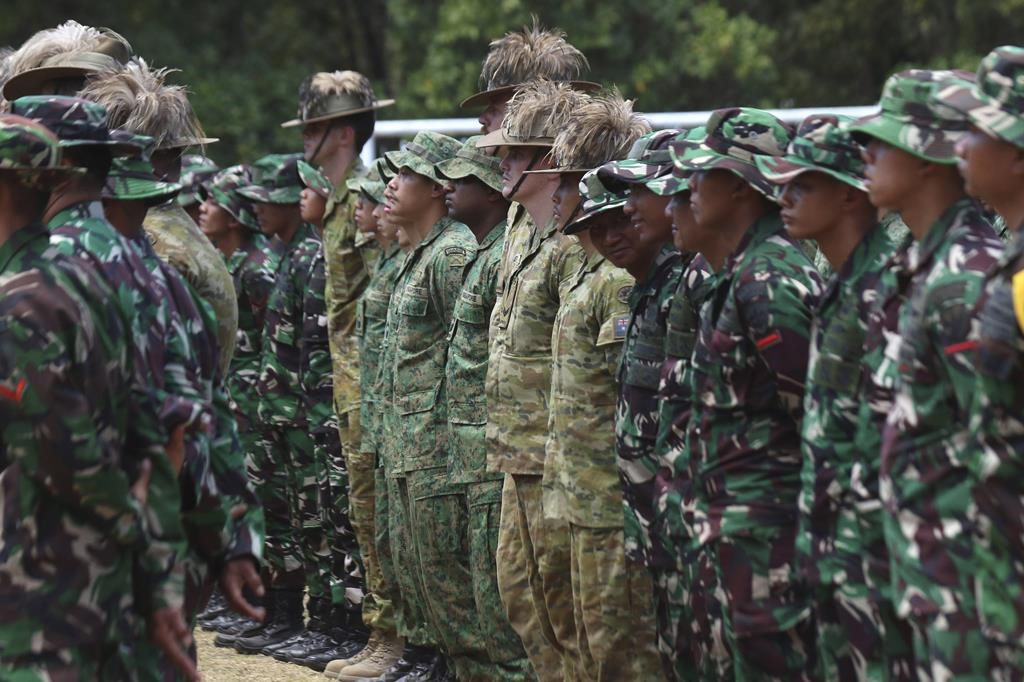US, Indonesia and 5 other nations hold war drills amid China concerns

JAKARTA, Indonesia (AP) — Soldiers from the U.S., Indonesia and five other nations began annual training exercises Thursday on Indonesia’s main island of Java while China’s increasing aggression is raising concern.
American and Indonesian soldiers have held the live-fire Super Garuda Shield drills since 2009, and Australia, Japan and Singapore joined last year. The United Kingdom and French forces are participating in this year’s exercises, with a total of about 5,000 personnel.
China sees the expanded drills as a threat, accusing the U.S. of building an Indo-Pacific alliance similar to NATO to limit China’s growing military and diplomatic influence in the region.
Advertisement
Brunei, Brazil, Canada, Germany, India, Malaysia, Netherlands, New Zealand, Papua New Guinea, Philippines, South Korea, and East Timor also sent observers to the two-week exercises in Baluran, a coastal town in East Java province.
The commanding general of U.S. Army Pacific, Gen. Charles Flynn, said the 19 nations involved in the training are a powerful demonstration of multilateral solidarity to safeguard a free and open Indo-Pacific region.
“Super Garuda Shield 2023 builds on last year’s tremendous success,” Flynn said in a statement released by the U.S. Embassy in Jakarta on Tuesday, “This joint, multinational training exercise displays our collective commitment and like-minded unity, allowing for a stable, secure, and more peaceful, free and open Indo-Pacific.”
The statement said at least 2,100 U.S. and 1,900 Indonesian forces will enhance their interoperability capabilities through training and cultural exchanges that include a command and control simulation, an amphibious exercise, airborne operations, an airfield seizure exercise, and a combined joint field training that culminates with a live-fire event.
Garuda Shield is being held in several places, including in waters around Natuna at the southern portion of the South China Sea, a fault line in the rivalry between the U.S. and China.
Advertisement
Indonesia and China enjoy generally positive ties, but Jakarta has expressed concern about what it sees as Chinese encroachment in its exclusive economic zone in the South China Sea.
The edge of the exclusive economic zone overlaps with Beijing’s unilaterally declared “nine-dash line” demarking its claims in the South China Sea.
Increased activities by Chinese coast guard vessels and fishing boats in the area have unnerved Jakarta, prompting Indonesia’s navy to conduct a large drill in July 2020 in waters around Natuna.
Indonesian Foreign Minister Retno Marsudi commented Thursday on China’s newly published “Standard Map,” which shows its territorial claims in the South China Sea crossing over the maritime exclusive economic zones of Malaysia near Sabah and Sarawak, and several other countries such as Brunei, the Philippines, Indonesia, and Vietnam.
She urged China to respect international law, saying the “drawing of any (territorial) lines or any claims must be in accordance” with the United Nations Convention on the Law of the Sea.
Advertisement
Chinese Foreign Ministry spokesperson Wang Wenbin on Wednesday called on other countries to refrain from “over-interpreting” the map.
Malaysia’s Foreign Ministry on Wednesday rejected China’s “unilateral claims” and said the map is “not binding” for Malaysia.
India lodged a formal objection on Tuesday over the map, which shows Arunachal Pradesh and the Doklam Plateau, over which the two sides have feuded, as being within China’s borders.
The Philippines on Thursday said the map was China’s latest attempt to claim sovereignty over Philippine features and maritime zones and said it has no basis under international law.
Vietnam also protested that the map and the “nine-dash line” claims violate Vietnam’s sovereignty over the Paracel and Spratly islands and jurisdiction over its waters and must be void because they violate international law, particularly UNCLOS.
Advertisement
Niniek Karmini, The Associated Press